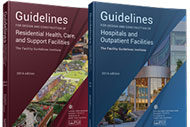ASHE urges members to vote on NFPA codes
The American Society for Healthcare Engineering (ASHE) is urging members who are also part of the National Fire Protection Association (NFPA) to vote on two important health care codes at NFPA’s annual conference in June. Although the Centers for Medicare & Medicaid Services adopted the 2012 editions of NFPA 99 and NFPA 101 in November, NFPA is reviewing changes for the 2018 editions. “ASHE has been working hard to align all of the various codes and standards to have less overlap, fewer gaps and fewer code conflicts,” Chad Beebe, AIA, SASHE, ASHE's deputy executive director, wrote in a column on ASHE's website. “This work doesn’t happen over one code development cycle, however. Aligning the codes is a long process that occurs over several editions."
USP 797 to receive second round of comments
The United States Pharmacopeial Convention (USP) received more than 8,000 comments from more than 2,500 stakeholders from Sept. 25, 2015, to Jan. 31, 2016, regarding revisions to its 797 standard, which governs sterile preparation spaces for pharmaceutical compounding. Based on the number of comments, USP will publish the revised chapter for a second round of public comments before issuing the final standard. USP says it does not yet have an anticipated date for the chapter’s republication.
Study addresses reducing alarm fatigue in ICUs
A study published by the Joint Commission's Journal on Quality and Patient Safety showed the results of targeted interventions in reducing alarm fatigue. After implementing measures such as adding short delays to allow for alarm self-correction and providing alarm notification through a secondary device, average alarms per bed decreased 61 percent. The study documented false and nonactionable alarms and found that they create distraction and dissatisfaction among nursing staff.
ASPR posts resources on new CMS emergency rule
The Department of Health & Human Services Office of the Assistant Secretary for Preparedness and Response has developed a new resource to help health care facilities comply with the Centers for Medicare & Medicaid Services' new emergency preparedness requirements, including a chart that highlights requirements by provider type. The new requirements went into effect Nov. 15, 2016, with participating facilities being given one year to comply. The rule applies to 17 provider types, and specific requirements are adjusted based on classification.
VA reduces MRSA after nationwide initiative
The Veterans Health Administration (VA) dramatically reduced health care-associated infection (HAI) rates in its facilities nationwide, according to a study published in the American Journal of Infection Control. The VA program included having a dedicated methicillin-resistant Staphylococcus aureus (MRSA) prevention coordinator at each facility to oversee a bundle of interventions: universal active surveillance (screening) on admission, unit-to-unit transfer and discharge; contact precautions for those colonized or infected with MRSA; adherence to hand hygiene; and institutional culture change where infection prevention becomes everyone’s business. The study’s researchers found that between October 2007 and September 2015, monthly HAI rates dropped 87 percent in intensive care units (ICUs), 80.1 percent in non-ICUs, and 80.9 percent in spinal cord injury units (SCIUs). In long-term care facilities (LTCFs), rates fell 49.4 percent during July 2009 to September 2015. During September 2015, only two MRSA infections were reported in ICUs, 20 in non-ICUs (with three in SCIUs), and 31 in LTCFs nationwide.





